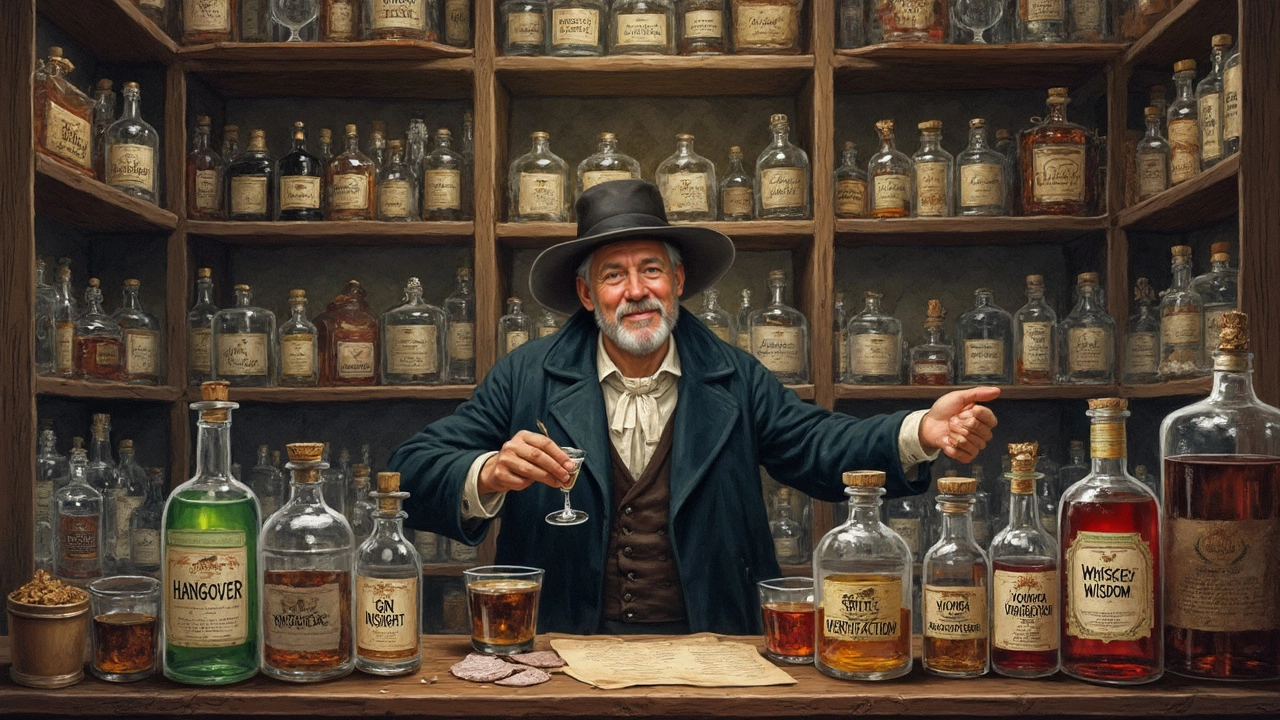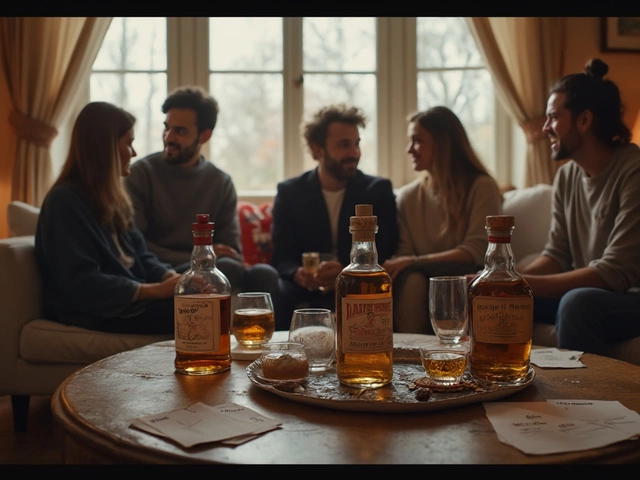You know that feeling when you wake up the morning after a great night out, head pounding and wondering why you drank so much? Yeah, we've all been there. If you've ever pondered whether it's the spirits themselves or how you consume them that lead to a hangover, you're not alone. Let's get into it and see how your favorite spirits might be treating you the next day.
First off, hangovers are the result of several things happening in your body after drinking. Dehydration, sleep disruption, and that sneaky toxin called acetaldehyde—all contribute to that dreaded morning-after feeling. But how do spirits fit into this?
Each type of spirit contains different congeners, which are chemicals produced during fermentation that contribute to taste, aroma, and yes, hangovers. Generally, darker spirits like whiskey and rum are loaded with more congeners than lighter spirits like vodka. So, if you're sipping on a well-aged scotch, you might be setting yourself up for a rough morning.
- What Causes Hangovers?
- Breaking Down Different Spirits
- Factors That Can Hurt or Help
- Tips to Avoid the Dreaded Hangover
What Causes Hangovers?
Alright, let's break down the mystery of the dreaded hangover. Many folks blame the alcohol itself, but there's more to it than just that. When you dive into a bottle of your favorite spirits, several things happen in your body that can lead to feeling awful the next day.
Dehydration and Alcohol
One of the biggest culprits behind a hangover is dehydration. Alcohol is a diuretic, meaning it makes you pee more. This can lead to you losing more fluids than you take in, causing your body to become dehydrated. And that dehydration? It can leave you with dry mouth, fatigue, and one nasty headache.
Sleep Disruption
Think drinking helps you sleep like a baby? Think again. While booze might knock you out faster, it disrupts rapid eye movement (REM) sleep. This means less quality sleep and more tossing and turning, leaving you groggy the next morning.
The Role of Congeners
Different types of spirits have various levels of congeners—these are chemicals that are formed during fermentation that give flavor and aroma. Darker drinks like whiskey and rum are normally high in congeners, which can lead to worse hangovers compared to their lighter cousins, like vodka and gin.
Acetaldehyde and the Liver
Your liver works overtime when you drink, metabolizing alcohol into acetaldehyde, a toxic compound. Acetaldehyde is eventually broken down into harmless substances, but not before contributing to your hangover symptoms. The more you drink, the more time you're dealing with these toxins in your body.
Here's a quick look at how peak hangover symptoms stack up:
| Symptom | Severity Scale (1-5) |
|---|---|
| Headache | 4 |
| Fatigue | 3 |
| Nausea | 2 |
| Dehydration | 5 |
And there you have it—the not-so-fun science behind hangovers. The more you know about what causes them, the better you can plan your night out and hopefully dodge feeling like a zombie the next day.
Breaking Down Different Spirits
Not all spirits are created equal, especially when it comes to how they affect hangovers. Each type of spirit has a unique profile that can impact both the experience of drinking it and the after-effects.
Vodka
Let's start with vodka. Known for its purity, good vodka typically has fewer congeners compared to other spirits. If you're opting for a less troublesome hangover, vodka is often a safe bet. It's usually made from grains or potatoes and goes through multiple distillations. This process strips out most congeners, giving it a clear advantage in the hangover department.
Whiskey
Whiskeys, especially the darker ones like bourbon, are notorious for their higher congener content. These congeners give whiskey its rich, complex flavors, but they also tend to contribute to more severe hangovers. Whether you're sipping on bourbon or Scotch, the aging process in charred oak barrels adds depth at the expense of next-morning clarity.
Rum
Rum's congener load can vary greatly depending on whether it's white, dark, or spiced. Generally, darker rums have more congeners due to longer aging and additional spices or caramel coloring. If you're a fan of mixing a Cuba Libre at home, just remember your rum choice could influence how you feel the next day.
Gin
Gin, like vodka, tends to be lower in congeners because it usually starts with a grain alcohol base that gets distilled multiple times. However, the botanical ingredients used in gin production can still affect how your body metabolizes it, making your next morning more unpredictable than with vodka.
Tequila
Last but not least, tequila. Made from the agave plant, good quality tequila—particularly 100% agave—may result in a lighter hangover compared to other spirits. The lesser-known fact is that blanco tequila varieties have fewer congeners than their aged counterparts like reposado or añejo.
Curious about how these spirits stack up against each other? Here's a quick congener comparison:
| Spirit Type | Congener Level |
|---|---|
| Vodka | Low |
| Whiskey | High |
| Rum (Dark) | Medium to High |
| Gin | Low |
| Tequila (Blanco) | Low |
So there you have it, a breakdown of how different spirits might play into your hangover scenario. Choose wisely, and maybe next time, you'll enjoy your night without fearing the dawn.

Factors That Can Hurt or Help
When it comes to spirits and hangovers, several factors can either ramp up or help prevent that regrettable post-party feeling. Understanding these can make a big difference in your drinking experience.
Strength and Quantity
Obviously, the more you drink, the worse the hangover. But it's not just about quantity—spirits are generally stronger than other alcoholic beverages. When you're sipping on a glass of whiskey or vodka, you're taking in more alcohol in one serving. Moderation is key here; savor the taste rather than chugging down your favorite alcohol.
Mixers Matter
What you mix with your spirits makes a big difference. Sugary mixers can worsen hangovers by spiking your blood sugar, only to drop it suddenly later on. Consider using sparkling water or a splash of citrus instead. If you're adding mixers with caffeine, remember they can mask intoxication, leading you to drink more.
Hydration is Crucial
Before, during, and after drinking, staying hydrated can lessen the harsh morning effects. Alcohol is a diuretic, which means it makes you lose more fluids. So for every glass of alcohol, try having a glass of water too. Don't underestimate the power of hydration.
Quality of Alcohol
Cheap spirits often contain more congeners, which can make hangovers worse. Spending a bit more on quality products might save you a headache—literally. Good quality spirits are usually filtered better and contain fewer impurities.
Consider Eating Before You Drink
Having a meal before drinking slows down the absorption of alcohol, giving your liver a better chance at processing it. Reach for hearty foods that include protein, fats, and carbohydrates for the best results.
| Factor | Impact on Hangover |
|---|---|
| High Congeners | Increase |
| Hydration | Decrease |
| Sugary Mixers | Increase |
| Quality Alcohol | Decrease |
Taking these factors into account can dramatically improve your next day. While there's no magic wand to completely zap away a hangover, these insights can definitely make the experience less painful.
Tips to Avoid the Dreaded Hangover
Worried about waking up with a hangover after enjoying your favorite spirits? Here are some surefire ways to help minimize the pain of overindulgence. Don't worry; it's easier than you think to wake up feeling fresh.
1. Stay Hydrated
Alcohol, including our beloved spirits, can dehydrate you, making that hangover even worse. Try having a glass of water between each alcoholic drink to keep your hydration levels up. It sounds simple, but trust me, it makes a huge difference.
2. Eat Before You Drink
Food helps absorb alcohol and protects your stomach from irritation. Turns out, your grandma's advice wasn't just a myth. Opt for meals rich in carbs and fats, which slow alcohol absorption, helping you feel better the next day.
3. Choose Your Spirits Wisely
As mentioned, lighter spirits like vodka tend to have fewer congeners than darker ones. If you're planning a night out, maybe swap that whiskey for gin. Your future self will thank you!
4. Pace Yourself
Slow and steady wins the race! Sipping your drink rather than chugging it helps your body process alcohol more effectively. It also means you're less likely to overdo it without realizing it.
5. Avoid Mixing
Mixing different types of alcohol can lead to surprisingly intense hangovers. Stick with one kind of spirit throughout the night, and never go from dark to light in the same sitting.
Bonus Stats: Alcohol Strength
Here's something to ponder: different spirits have different alcohol strengths, which can affect how you feel later:
| Spirit Type | Typical ABV (Alcohol by Volume) |
|---|---|
| Vodka | 40% |
| Whiskey | 40-50% |
| Gin | 37.5-50% |
Understanding how strong your drink is can help you manage consumption better.
Follow these tips, and next time you enjoy a night with spirits, you might just avoid the dreaded morning-after feeling!


